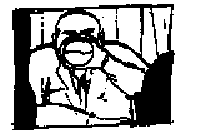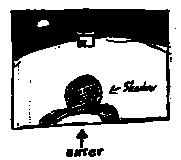SPACE ODDITY
Adam Pincus explores Cory McAbee’s quirky musical The American Astronaut
 |  |
 |  |
Several songs into a recent set by the Billy Nayer Show at the downtown New York nightclub Fez, a man in a shiny brown suit and a brown striped tie, with slicked back hair – the guy you’d have to assume was, in fact, Billy Nayer – told the assembled crowd, "Our first feature film has just been accepted into competition at the Sundance Film Festival." It was an unusual bit of patter from a singer.
And yet when Billy Nayer Show frontman and songwriter Cory McAbee takes his first feature to the Sundance Film Festival in January, audiences will see the work of an artist whose coincident and entirely entangled paths in music and film have resulted in something virtually unique in American independent film: a genre-bending, black-and-white, retro-futuristic musical.
The American Astronaut is written and directed by McAbee. In it, he stars as Samuel Curtis, a scruffy interplanetary trader who drives his beat-up rig around the solar system from roadhouse bar to mining town in a space-age future oddly colored by Depression Era production design and classic movie tropes. Through it all Curtis is pursued by his nemesis, Professor Hess, a man intent on his destruction. Somewhere along the way – it’s Jupiter, actually – he takes on a young lad named "The Boy who Actually Saw a Woman’s Breast," and, elsewhere in his journey, a feral youth. The action climaxes on Venus, the ladies’ planet, where Curtis and the evil Professor have their final showdown, a musical mano-a-mano.
 The film has been called a "a musically driven space western," and indeed, it features 14 songs by the band woven into the narrative in surprising ways. Bobby Lurie, McAbee’s partner in the Billy Nayer Show for the past 12 years and the band’s drummer, serves as musical director on the film and produced the soundtrack.
The film has been called a "a musically driven space western," and indeed, it features 14 songs by the band woven into the narrative in surprising ways. Bobby Lurie, McAbee’s partner in the Billy Nayer Show for the past 12 years and the band’s drummer, serves as musical director on the film and produced the soundtrack.
This will not be McAbee’s – or Billy Nayer’s – first trip to Park City. McAbee’s first short film, Billy Nayer, played at the festival in 1993. It was an animated "micro-musical" comprised of 2,173 of McAbee’s own paintings, done with house paint on paper. The film was made in his bathroom, on a cabinet door hot-glued to the wall, over the course of two-and-a-half years. The two-and-a-half minute vignette stars McAbee’s cartoon-land doppelgänger, Billy Nayer, crooning tunes in a bar with a drink in his hand.
Making short films grew in part out of McAbee’s restless creative pluralism. He paints and draws (his paintings serve as covers for Billy Nayer Show records like 1998’s "The Villain That Love Built" which features a brooding, stylized black-and-white portrait), he writes the band’s material, and fronts the show with a dead-serious affect that allows his smart, cryptic and frequently absurd songwriting to seem like something more intentional than novelty.
Billy Nayer returned to the festival again, in 1995, with The Billy Nayer Chronicles, a kind of multimedia revue in which the band would alternately play and show McAbee’s shorts, including The Man on the Moon, a Pixel Vision piece starring Buck Naked (of San Francisco Buck Naked and the Bare Bottom Boys) and McAbee, as well as 1995’s The Ketchup and Mustard Man, a half-hour live-action musical. The festival catalogue that year dubbed the Billy Nayer Show a "cabaret punk band" – a fair if incomplete description. As his short films got longer, and outlets for them more problematic, McAbee began writing the script for a feature film. Once he had a draft of The American Astronaut in hand, he proceeded to paint elaborate storyboards in order to help visualize the script.
The finished product – almost an illustrated novel of paintings, sketches and script pages – was accepted into the 1998 Sundance Screenwriters Lab, where McAbee worked with such varied veterans as Stewart Stern (Rebel Without a Cause) and Chris McQuarrie (The Usual Suspects).
Stern, in a "letter of recommendation" on the American Astronaut Web site (www.americanastronaut.com), says, "I found Cory’s writing to be immensely visceral, poetic and moving. His characters still haunt me." Much the same could be said of the music of the Billy Nayer Show. But in the end, distinguishing between different forms of media is something McAbee seems to rarely do.
VOD CALENDAR


 See the VOD Calendar →
See the VOD Calendar →


